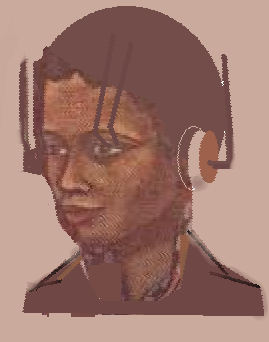BY LETTER
Duorkin, Ruth
 Image from Steve Bowers |
Ruth Duorkin was born the late Information Age with quadriplegia caused by cerebral palsy. During her teens she received primitive neural interfacing to give her an electronic voice, and at 16 helped to design a powered exoskeleton which allowed her to stand and eventually walk. This experimental "bodywalker" system, a kind of hollow robot which encased her (largely incapable) body was at first slow and difficult to control, but with better interfacing and naturally-occurring neural accommodation she was able to move freely by her mid-twenties. Her exoskeleton incorporated systems to maintain her muscle tone, but her skeletomuscular system was already atrophied beyond recovery.
Exoskeletons for military and industrial use were becoming more sophisticated during this period, but Duorkin was one of the first to be permanently linked physically and neurally to such equipment. Many semi-artificial clades around the Terragen Sphere deem Duorkin to be among the first true, cyborgs.
She became a campaigner for differently-abled peoples' rights around the world, and following an assassination attempt in Venezuela in the early second century A.T. she incorporated a discrete kevlar outer skin to her bodyplan. She also was subject to sporadic hacking attacks on her net-connected components, against which she designed ingenious defences.
When she died her bodywalker system was preserved by the Smithsonian Institute as an example of early cyberhuman interfacing.
Appears in Topics
Development Notes
Text by Steve Bowers
Initially published on 07 January 2004.
Initially published on 07 January 2004.






